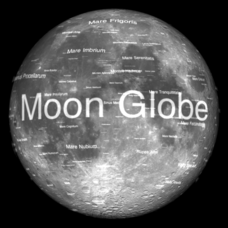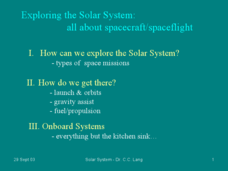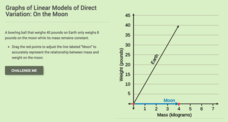Curated OER
Gingerbread Spacecraft
Students explore the different parts of the Cassini spacecraft. In this space science lesson, students create a model of the spacecraft using food products. They compare and contrast their model with the real one and evaluate its...
Curated OER
Settlement Exploration: Then and Now
NASA has crafted an imaginative and memorable series of lessons, "NASA and Jamestown Education Module." This instructional activity is one of the five components. In it, middle schoolers connect history and science by comparing the...
Midnight Martian
Moon Globe
Not just a simple globe of the moon, this interactive version allows you to choose lighting according to the location of the sun, views from different positions on Earth, and more! Satellite images and topographic data have been combined...
Space Awareness
The Sun Compass of the Vikings
Evidence shows the Vikings likely navigated by using a simple sundial to find their course. Videos, a short story, and discussion help bring this time period to life as they study European history with a hands-on experiment. Scholars...
Space Awareness
Britannia Rule the Waves
Could you determine longitude based on measuring time? Early explorers used a longitude clock to do just that. Scholars learn about early exploration and the importance of the invention of the clock. Then pupils build their own longitude...
Curated OER
Exploring the Solar System: All About Spacecraft/Spaceflight
Rarely do you find resources that reach high school astronomy learners. Here is something at their level! The physics of flyby missions is explained via several examples. Landing, penetrating, and roving spacecraft are examined. Diagrams...
Center for Math and Science Education
Pocket Solar System
How in the world can something as big as the solar system possibly fit in your pocket? Complete this simple modeling activity and find out, as young scientists gain an appreciation for the incredible scale of outer space.
Center for Math and Science Education
Solar System Launch
Trying to understand the vastness of outer space can be quite a challenge for young scientists. Help put things in perspective with this cross-curricular activity as students work in pairs creating scaled models of the solar system,...
Space Awareness
Meet Our Neighbors: Sun
The sun isn't just a ball of yellow! Young scientists learn about the features of the sun using a hands-on modeling activity. They build models of the sun using common household items to represent sunspots, solar prominence, and the...
American Museum of Natural History
Field Trip: Space Flight
Take a virtual trip to infinity and beyond. Pupils watch a space visualization that leaves Earth and heads to the ISS and then follows the Apollo missions to the moon. Scholars view detailed images of the space station and its different...
Curated OER
Moon Mining
Go on a moon mining expedition from the safety of your classroom with this space exploration simulation. Using simple models of the moon's surface prepared ahead of time by the teacher, young scientists are challenged with locating and...
Curated OER
Kids Astronomy Word Match
In this astronomy vocabulary activity, students examine 16 definitions and fill in the blanks with the astronomy terms defined.
Curated OER
Meteorite Musters
In this science worksheet, students conduct an experiment to collect small particles that come down in the rain or hail that are left over meteorites.
Curated OER
The Celestial Sphere and Circumpolar Motion
Students investigate the celestial sphere and circumpolar motion. In this science lesson, students view an applet, The Celestial Sphere and Circumpolar Motion. Students discuss the Earth's rotation and stellar movement.
Curated OER
The Tides
Students experience a computer based applet that explains why the Earth experiences tides.
Curated OER
Our Solar System
In this space science worksheet, students use the clues at the bottom of the sheet to solve the crossword puzzle on our solar system. They identify the different planets and their location in relation to the sun.
Curated OER
Our Sun
In this space science worksheet, learners use the clues at the bottom of the sheet to solve the crossword puzzle on our sun. They identify the cooler and visible surface areas of the sun, as well as what sunspots are on the sun.
Curated OER
Understanding the Cosmic Microwave Background (CMB)
How did our universe really begin? Explore the Science Big Bang Theory and Cosmic Microwave Background (CMB) with this multiple activity-based lesson that demonstrates that the increase of density due to the decrease of temperatures,...
School Science
The Big Bang Time Machine
Scholars take off on an interactive spaceship to explore a historical timeline of the big bang theory. They learn about the evolution of mammals and humans, the formation of stars and planets, and the chemical composition of the early...
CK-12 Foundation
Graphs of Linear Model of Direct Variation: On the Moon
You'll be over the moon about this resource. Scholars draw a line representing the weight of an object on the moon based on its mass. Consideration of the constant of proportionality allows them to see relationships between weight of an...
Curated OER
Planet Interiors
Students view cut-away images of the planets' interiors, comparing and contrasting them with the Earth's in written form. Students also classify each planet as "terrestrial" or "Jovian". The Planet Interiors applet on the CSA website...
Curated OER
The Reasons for the Season
Students explain the reason for the changes in season. In this lesson examining the relationship between the Earth and the Sun, students use an applet to discover how the alignment of the Earth and the Sun cause the change in seasons.
Curated OER
May Earth be Revolving around the Sun?
Ninth graders explore how Aristarchus used the position of the half-full Moon to estimate the distance to the Sun, and how he made a great error, but still figured out that the Sun is much larger than Earth.
Curated OER
Why is There a Tidal Bulge Opposite the Moon?
Students simulate how the Moon causes ocean tides. In this earth science lesson, students calculate gravitational acceleration using a mathematical formula. They compare the force of attraction between the Earth, Moon and Sun system.

























